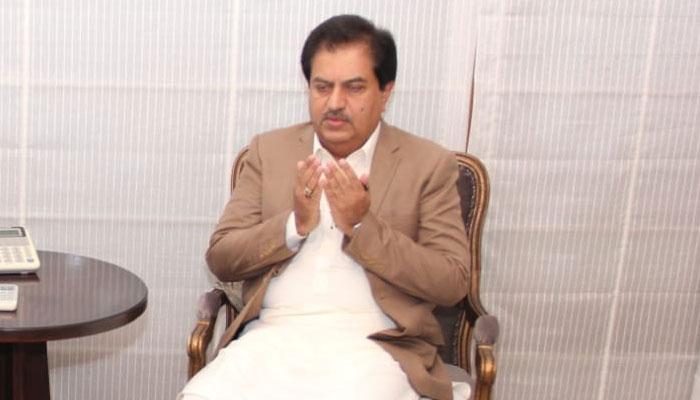Appeals of 700 Sindh employees pending for regularisation: meeting told
Applications or appeals of nearly 700 contractual or ad-hoc employees have been pending with different departments of the Sindh government for regularisation of their services in accordance with a law passed to this effect in 2013.
This was told to the participants of a top-level meeting which held at Sindh Secretariat on Friday. The meeting was chaired by Sindh Chief Secretary Syed Mumtaz Ali Shah.
The meeting was convened to discuss cases of contractual employees pending with different departments of the Sindh government to regularise their services in accordance with the Sindh (Regularization of ad-hoc Employees) Act, 2013.
The provincial chief secretary directed the participants of the meeting to take the relevant law into account for expeditiously deciding appeals of the contractual employees for regularisation of their services.
He said the court should be duly intimated about the cases of the employees whose services could not be regularised in accordance with the law.
He said the secretaries of different administrative departments and deputy commissioners posted in different districts should convene meeting of the relevant scrutiny committees to decide the cases of contractual employees who wanted regularisation of their services.
The chief secretary said such cases of the contractual and ad-hoc employees associated with different departments of the Sindh government should be decided on a timely basis.
The CS said the services of such employees should be regularised whose cases were in conformity with the provisions of the relevant law. Talking about the appeals of such contractual employees whose case decision could not be taken due to administrative and legal complications, the chief secretary said the cases should be decided after taking lawful advice from the Sindh Law and Services Department.
Briefing the meeting about the details of the cases, Sindh Services Secretary Naveed Ahmed Shaikh said appeals of 36 contractual or ad-hoc employees of the works and services department had been pending for regularisation of their services, 380 such cases had been pending with the school education department, one such case had been pending with the information department, 77 applications with the health department, five cases with the agriculture department, 90 cases with the Benazir Bhutto Shaheed Human Resource Research and Development Board, nine cases with the revenue department, 90 cases with the anti-encroachment department, while four such appeals of contractual or ad-hoc employees had been pending with culture department.
Citizen portal
Speaking on the occasion, the Sindh chief secretary asked the secretaries of different administrative departments of the Sindh government to remain punctual in their office timings and also make their subordinate staff to observe punctuality.
He also asked the administrative secretaries to hold interaction with citizens to expeditiously resolve their legitimate issues. He asked the Sindh government’s officials to use the relevant forums to expeditiously resolve the public complaints received through the Pakistan Citizen Portal.
The Sindh chief secretary issued these directives a day after he met a delegation of the Pakistan Tehreek-e-Insaf, which has its opposition leader in the Sindh Assembly. The delegation was led by PTI Karachi president Khurrum Sher Zaman and comprised party lawmakers in Sindh. The delegation had met the CS to ask him about the status of thousands of pending complaints filed with the Prime Minister’s citizen portal by people of Sindh.
The chief secretaries posted in the provinces have been made responsible by Prime Minister Imran Kahn to get resolved the public complaints received at the Citizen Portal which relate to the different departments and subsidiary institutions of the provincial governments, including the municipal bodies.
The meeting was also attended by the Sindh government secretaries for the departments of information, labour, agriculture, excise, and senior members of the Board of Revenue.
-
 James Van Der Beek's Friends Helped Fund Ranch Purchase Before His Death At 48
James Van Der Beek's Friends Helped Fund Ranch Purchase Before His Death At 48 -
 King Charles ‘very Much’ Wants Andrew To Testify At US Congress
King Charles ‘very Much’ Wants Andrew To Testify At US Congress -
 Rosie O’Donnell Secretly Returned To US To Test Safety
Rosie O’Donnell Secretly Returned To US To Test Safety -
 Meghan Markle, Prince Harry Spotted On Date Night On Valentine’s Day
Meghan Markle, Prince Harry Spotted On Date Night On Valentine’s Day -
 King Charles Butler Spills Valentine’s Day Dinner Blunders
King Charles Butler Spills Valentine’s Day Dinner Blunders -
 Brooklyn Beckham Hits Back At Gordon Ramsay With Subtle Move Over Remark On His Personal Life
Brooklyn Beckham Hits Back At Gordon Ramsay With Subtle Move Over Remark On His Personal Life -
 Meghan Markle Showcases Princess Lilibet Face On Valentine’s Day
Meghan Markle Showcases Princess Lilibet Face On Valentine’s Day -
 Harry Styles Opens Up About Isolation After One Direction Split
Harry Styles Opens Up About Isolation After One Direction Split -
 Shamed Andrew Was ‘face To Face’ With Epstein Files, Mocked For Lying
Shamed Andrew Was ‘face To Face’ With Epstein Files, Mocked For Lying -
 Kanye West Projected To Explode Music Charts With 'Bully' After He Apologized Over Antisemitism
Kanye West Projected To Explode Music Charts With 'Bully' After He Apologized Over Antisemitism -
 Leighton Meester Reflects On How Valentine’s Day Feels Like Now
Leighton Meester Reflects On How Valentine’s Day Feels Like Now -
 Sarah Ferguson ‘won’t Let Go Without A Fight’ After Royal Exile
Sarah Ferguson ‘won’t Let Go Without A Fight’ After Royal Exile -
 Adam Sandler Makes Brutal Confession: 'I Do Not Love Comedy First'
Adam Sandler Makes Brutal Confession: 'I Do Not Love Comedy First' -
 'Harry Potter' Star Rupert Grint Shares Where He Stands Politically
'Harry Potter' Star Rupert Grint Shares Where He Stands Politically -
 Drama Outside Nancy Guthrie's Home Unfolds Described As 'circus'
Drama Outside Nancy Guthrie's Home Unfolds Described As 'circus' -
 Marco Rubio Sends Message Of Unity To Europe
Marco Rubio Sends Message Of Unity To Europe




